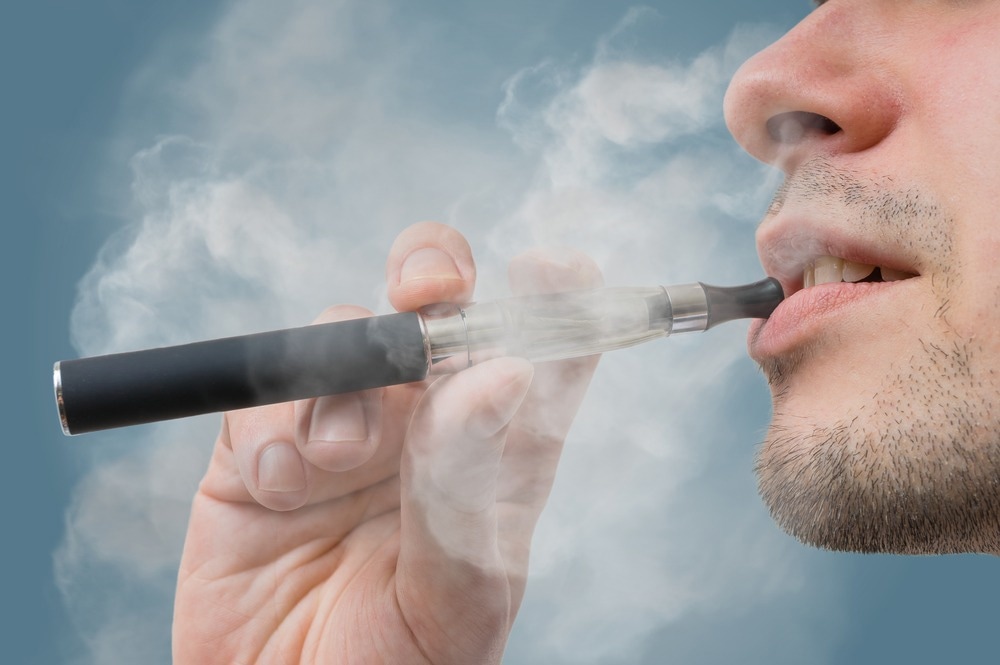Electronic cigarette (e-cigarette) usage often leads to respiratory conditions and may also increase an individual’s vulnerability to the coronavirus disease 2019 (COVID-19) due to compromised lung function.
Additional contact between the fingers and mouths, sharing of vape devices, or removal of the mask during vaping while using e-cigarettes can also increase the risk of COVID-19. However, nicotine appears to reduce the risk of COVID-19, either through its anti-inflammatory properties or interaction between nicotinic acetylcholine receptors and COVID-19.
 Study: Electronic cigarette use and risk of COVID-19 among young adults without a history of cigarette smoking. Image Credit: vchal / Shutterstock.com
Study: Electronic cigarette use and risk of COVID-19 among young adults without a history of cigarette smoking. Image Credit: vchal / Shutterstock.com
Although few studies have reported increased severity of COVID-19 with e-cigarette use, several studies have reported no association to exist between COVID-19 and e-cigarette use in adults. Since some individuals will both vape and smoke cigarettes, it is difficult to identify the independent risk of e-cigarettes.
A new Preventive Medicine journal study used a population-based retrospective cohort to examine the risk of polymerase chain reaction (PCR)-confirmed COVID-19 with the use of e-cigarettes.
About the study
The current study was carried out from March 5, 2020, to November 11, 2020, and included participants who were between the age of 18 to 35 years of age, did not have a history of smoking, had a continuous Kaiser Permanente Northern California (KPNC) health plan enrollment in the previous year, and had one or more in-person inpatient or outpatient non-emergency visit from May 18, 2019, until the beginning of the study.
The primary outcome of the current study was the diagnosis of COVID-19 by a positive PCR test. The use of e-cigarettes was assessed by medical assistants during the time of primary care visits. Information regarding previous use of e-cigarettes was also collected.
Data on age, sex, any enrollment in a Medicaid insurance plan in the prior year, race/ethnicity, neighborhood deprivation index (NDI), medical service area, medical comorbidities, and body mass index (BMI) were also collected.
Study findings
Taken together, 1.2% and 1.6% of the participants reported being former or current users of e-cigarettes, respectively, whereas 97.2% reported never having used e-cigarettes. Current and former users were most commonly male, not obese, and non-Hispanic White. Most of the current users were reported to live in less deprived neighborhoods.
The COVID-19 test positivity rate was higher for former users as compared to current users or those who never used e-cigarettes.
Taken together, the current study demonstrated that although e-cigarette usage led to health risks in young adults, their current use was not associated with COVID-19. However, further research is needed to confirm these findings.
Limitations
One limitation of the current study was that the screening procedure for e-cigarette use was new and not universal. Second, the results might not be generalizable.
The frequency, duration, and heaviness of e-cigarette use were also not assessed in the current study. The researchers also did not include COVID-19-positive participants with minor or no symptoms.
An additional limitation was that the study took place during the initial months of the pandemic and might not be generalizable to later periods of the pandemic. Finally, the researchers did not determine whether other factors such as social distancing and asymptomatic testing varied with e-cigarette status.
Journal reference:
- Young-Wolff, K. C., Slama, N., Alexeef, S. E., et al. (2022). Electronic cigarette use and risk of COVID-19 among young adults without a history of cigarette smoking. Preventive Medicine. doi:10.1016/j.ypmed.2022.107151..